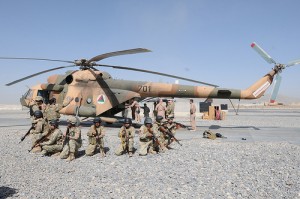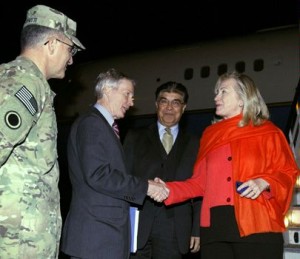“Oddly Passive” in the World of Drone Killing
The WaPo has an important piece on the use of drones. One thing bmaz noted about it on Twitter, for example, is that CIA had Anwar al-Awlaki under such multi-drone surveillance before they killed him, it is not credible that they killed Samir Khan, also an American, out of ignorance of his presence. Particularly given their claim they had made sure no “civilians wandered in the cross hairs.”
Two Predators pointed lasers at Awlaki’s vehicle, and a third circled to make sure that no civilians wandered into the cross hairs.
So the article makes it clear that the Administration doesn’t consider non-operational American citizen propagandists “civilians.”
But I’m particularly interested in what a “former official who served in both [the Bush and Obama] administrations and was supportive of the [drone] program” had to say about who was promoting increased use of drones. The official starts by pointing to Hillary Clinton, Leon Panetta, and John Brennan as the program’s champions.
Secretary of State Hillary Rodham Clinton, former CIA director and current Defense Secretary Leon E. Panetta, and counterterrorism adviser John O. Brennan seemed always ready to step on the accelerator, said a former official who served in both administrations and was supportive of the program. Current administration officials did not dispute the former official’s characterization of the internal dynamics.
And then calls the Commander-in-Chief “oddly passive” when it comes to drones.
Obama himself was “oddly passive in this world,” the former official said, tending to defer on drone policy to senior aides whose instincts often dovetailed with the institutional agendas of the CIA and JSOC.
The senior administration official [who also disputed that the drones were driving our counterterrorism policy and not vice versa] disputed that characterization, saying that Obama doesn’t weigh in on every operation but has been deeply involved in setting the criteria for strikes and emphasizing the need to minimize collateral damage.
“Everything about our counterterrorism operations is about carrying out the guidance that he’s given,” the official said. “I don’t think you could have the president any more involved.”
The description of a passive Obama accords with other descriptions of Obama’s role in the drone war. As I noted in October, even Obama’s “approval” of the Anwar al-Awlaki targeting, according to Mark Hosenball, consisted only of not rejecting the recommendations of the Principals Committee’s recommendation (and therefore people like Hillary, Brennan, and Panetta).
The role of the president in ordering or ratifying a decision to target a citizen is fuzzy. White House spokesman Tommy Vietor declined to discuss anything about the process.
[snip]
Other officials said the role of the president in the process was murkier than what Ruppersberger described.
They said targeting recommendations are drawn up by a committee of mid-level National Security Council and agency officials. Their recommendations are then sent to the panel of NSC “principals,” meaning Cabinet secretaries and intelligence unit chiefs, for approval. The panel of principals could have different memberships when considering different operational issues, they said.
[snip]
Several officials said that when Awlaki became the first American put on the target list, Obama was not required personally to approve the targeting of a person. But one official said Obama would be notified of the principals’ decision. If he objected, the decision would be nullified, the official said.
A former official said one of the reasons for making senior officials principally responsible for nominating Americans for the target list was to “protect” the president.
In addition, Joby Warrick’s description of the targeting approval process used before we killed Baitullah Mehsud and his young wife shows just the Director of the CIA signing off on the killing.
So it’s not news, exactly, that Obama has been given plausible deniability about the out-of-control backlash-creating program. Nor that the Administration wants to sustain that plausible deniability while still pursuing political advantage from the drone strikes.
But I am interested in the implication Greg Miller leaves as a result. Obama is passive, and so his senior aides control the program (perhaps one of the aides denying that Obama is passive?), and they, in turn, basically support the “the institutional agendas of the CIA and JSOC.”
Here’s what that senior aide had to say to try to deny that we’re letting a fondness for drones drive our counterterrorism policy.
“People think we start with the drone and go from there, but that’s not it at all,” said a senior administration official involved with the program. “We’re not constructing a campaign around the drone. We’re not seeking to create some worldwide basing network so we have drone capabilities in every corner of the globe.”
It seems there’s a third option, an alternative to “we’re building so many drone bases because we like drones” and “we have so many drones because there are so many possible targets for them.”
That third option is that JSOC and CIA have certain “institutional agendas” that center on wielding the power of drones anywhere in the world to implement a policy they’ve dreamt up rather than their civilian Commander-in-Chief. There’s a hint, at least, that drones not only take the human out of the cockpit, but also take the Commander-in-Chief out of the cockpit as well.


